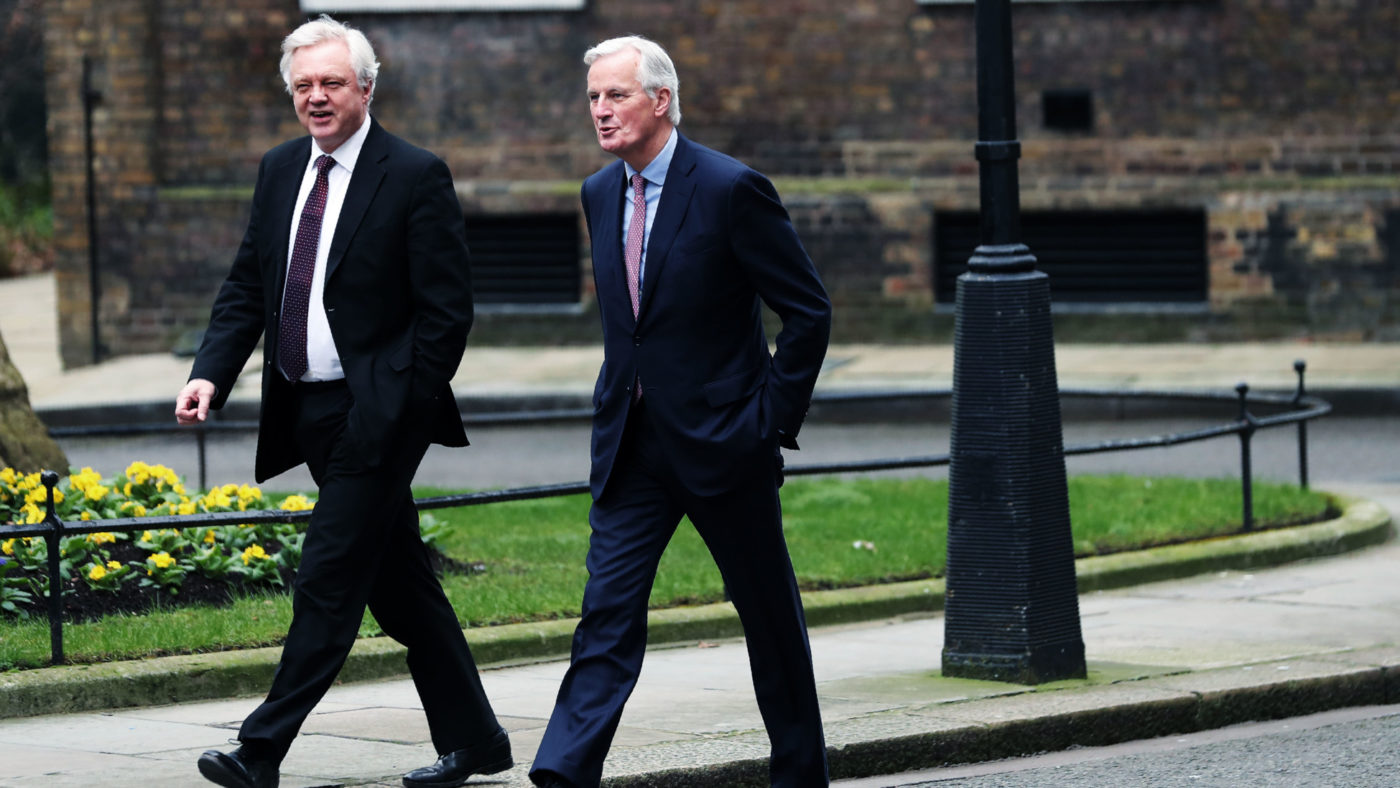In the coming weeks, UK and EU negotiators will be discussing the proposed “implementation period” – the Prime Minister’s preferred name for the “transition period”. The EU’s Chief Negotiator, Michel Barnier, reiterated the EU’s intransigence on its position for the status quo during the transition period last week. Despite our continuing to pay into the EU’s coffers, the UK would have no MEPs, no Commissioners, have to accept EU laws brought in and, of course, the jurisdiction of the European Court of Justice.
It’s all very well Barnier’s opposite number, our Secretary of State for Exiting the European Union, David Davis – telling us last month that we have to “keep sight of the fact that this is a bridge to a new future partnership”, but we seem to be taking one step forward and then another one or two backwards, instead of gripping the bull by the horns. We can walk out of these negotiations with no deal – free from the constraints of the EU – and can immediately adopt WTO trade tariffs, which in most instances will mean we will be much better off. A report earlier this month by the economist Patrick Minford indicated the EU would be £500 billion worse off if we walk out with no deal.
It isn’t clear why most businesses need this transition/implementation period at all. We have now known for 18 months that Britain is leaving the EU. Unfortunately, big businesses have been lobbying via the biased, part-EU-funded CBI – and other Remainer groups – out of self-interest, painting an excessively pessimistic picture of a transition-free Brexit.
The majority of UK businesses, however, have had more than enough time to prepare themselves for Brexit without an implementation period. Rather than playing games and trying to delay the inevitable, businesses should be embracing the vast opportunities on offer throughout the world.
Nevertheless, if an implementation period is going to happen, it must be strictly time-limited and must not leave Britain as a dependent vassal state of the EU. Unfortunately, the EU’s negotiating guidelines issued this week appear to make this disastrous position likely. EU leaders have now agreed Britain would be in a “status quo transition without institutional representation.” Despite continuing to pay huge sums into the EU budget and abiding by EU laws, we will have no say in the legislative process.
In his press conference, Michel Barnier stridently sought to blackmail the UK into accepting his demands. He stated the transition is conditional on UK acceptance of EU demands on subjects like citizens’ rights, freedom of movement, and the Irish border, making it “high time to prepare” for no deal. No one should be surprised by this bullying from Barnier, but it’s about time our businesses and civil services recognise they cannot rely on any transition deal. It seems increasingly likely the best option for the UK would be to leave without a deal in March 2019 – an eventuality for which we must all be prepared.
We must not accept any new EU laws during this period. The EU might try and use this opportunity to implement legislation which Britain has long opposed – such as a financial transaction tax – which would have disastrous consequences for our vital financial services sector.
To be forced to accept legal supremacy of the institutions of another state after Brexit, without any say in those institutions whatsoever, would be akin to being a colony of the EU – a vassal state.
Perhaps the most important driving force behind the vote to leave the EU was the desire to control and reduce immigration coming from the EU. It is therefore vital that Britain begins to establish a new immigration regime now, to come into effect either at the start of the implementation period, or earlier if we decide to leave with no deal. The Home Secretary, Amber Rudd, must leave aside her former support for the Remain campaign and prepare our borders for a new, tighter immigration system in readiness.
It is not acceptable to have to wait for a further two years after Brexit to introduce these necessary controls. During this time, immigration may well increase as EU migrants take their last opportunity to exercise their right to enter Britain.
As David Davis rightly argued in Middlesbrough, Britain must be able to negotiate and sign new free trade deals during any implementation period. EU negotiators hinted in their guidelines they would seek to inhibit the UK’s ability to sign trade deals during the transition. Yet the ability to negotiate now would allow us to seize the key opportunities of Brexit, and to put deals in place during the first days of our fully leaving the EU. Australia, New Zealand – and as confirmed in Davos last week by President Trump, the USA – are all keen to agree wide-ranging free trade agreements with the UK as soon as possible.
A strictly time-limited implementation period is only acceptable if it does what it says on the tin, and allows us to implement Brexit quickly. We must reject any transition deal which effectively keeps us in the EU until the end of 2020. We need the Government to execute our democratic decision to regain control of our borders, our laws and our trading. Remainers and the EU need to understand this and stop wasting precious time. If the overall agreement between the UK and EU is unsatisfactory, we must leave fully on March 29 2019, and we should be confident moving forward with trading on WTO rules.


